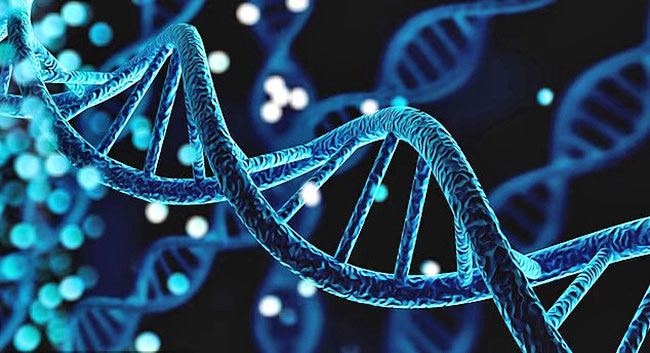|

by Rob Waugh
October 05, 2025
from
DailyMail Website

(Stock Image)
Scientists claim to have found evidence of alien genetic
manipulation in human DNA, with large sections of genes
seemingly 'inserted' into people, potentially affecting millions of
humans.
If confirmed, the discovery could fundamentally alter our
understanding of human evolution and the future of the human race,
said lead researcher Dr
Max Rempel, the founder and
chief executive of the
DNA Resonance Research Foundation.
The study, which has not yet undergone peer review, analyzed DNA
from both ordinary people and self-reported
alien abductees.
In an examination of 581 complete families from the
1,000 Genomes Project, Rempel found
'large
sequences' of DNA in 11 families that appeared to match
neither parent.
These anomalies include,
a cluster of 348 non-parental genetic
variants, some of which were from children born before 1990,
ruling out human gene-editing technologies such as
CRISPR, which only emerged in
2013.
Rempel cautioned that his findings are
preliminary and require more rigorous analysis.
'No conclusive evidence yet, because we need
better datasets, which are available only on approval. That
takes time and effort,' he said.
Nevertheless, he believes the implications could
be staggering.
'Humanity may be undergoing genetic
transformation.
If confirmed, it could be possible to detect
which humans carry alien DNA, essentially identifying hybrids,'
he explained.
The researcher's hypothesis resonates with fringe
theories long circulating among
UFO enthusiasts and
conspiracy theorists... [sic]
Some have suggested that alleged alien-human hybrids exist, citing
examples such as the so-called
Nazca mummies, which purportedly
contain both human and alien DNA.
Rempel's findings, while not conclusive, could lend scientific
credence to these theories if validated.
However,
both NASA and the US Pentagon
have admitted that
alien life does not exist...
[sic]
In addition to analyzing publicly available
family DNA datasets, Rempel reviewed 23andMe results from
individuals who self-identify as alien abductees.
He found that some families showed strings of non-parental
markers, though others did not.
Rempel noted that current commercial genotyping services, which rely
on array-based data, are insufficiently precise to confirm such
radical claims.
Instead, he advocates for next-generation
sequencing (NGS) or whole-genome sequencing (WGS), which
can detect novel variants with much higher resolution.
According to Rempel, if he can access DNA from parents and children
who self-report as alien abductees, high-resolution
sequencing could definitively identify alien insertions.
He suggested that future studies might reveal astonishing
possibilities, including humans developing unusual abilities such as
telepathy as a result of genetic modifications.

(Stock Image)
Rempel emphasized the need for high-quality, non-cultured genetic
data to avoid artifacts caused by cell culturing.
'Most public DNA databases contain old data
from cultured cells. Culturing can produce genomic changes, so
we cannot treat these results as proof,' he said.
Moving forward, he hopes to secure funding and
access to public DNA repositories for further research.
While Rempel's work remains controversial, he insists it is driven
by genuine scientific curiosity.
He has a PhD from the Institute of Gene Biology but is known
for exploring unconventional fields, including DNA resonance, which
investigates subtle fields around human bodies.
Skeptics, including UFO researchers, have urged caution.
Nigel Watson, author of Portraits of Alien Encounters
Revisited, highlighted the small sample size and the inherent
challenges of studying self-reported abductees.
'Alien abduction experiences can stem from a
variety of terrestrial factors. We need to carefully verify
these accounts before drawing conclusions about DNA,' he said.
Watson added that technical errors or unknown
biological mechanisms could also explain the anomalies.

(Stock Image)
Despite the skepticism, both Rempel and Watson agreed
that further genetic research involving volunteer abductees
could provide groundbreaking insight.
'If proven, this would be as world-shattering
as recovering a flying saucer,' Watson said.
Rempel's study also raises ethical questions.
If alien DNA can be identified in humans,
how should the rights of those individuals be
protected?
He noted that a high percentage of
people with neurodivergent traits,
such as,
...could potentially carry these genetic
insertions, though this remains speculative.
The study underscores the urgent need for rigorous, high-resolution
genetic analysis. Rempel has expressed interest in collaborating
with families willing to provide DNA samples and pay for sequencing.
He believes that such research could definitively show whether
extraterrestrial forces are influencing human genetics.
In the meantime, Rempel continues to advocate for literacy in
'alien hybridization' and DNA resonance, suggesting that
understanding these phenomena could inform major decisions about
humanity's future.
'We need to consider how much alien
hybridization is healthy for the planet, and which alien races
we might give priority,' he said.
|




